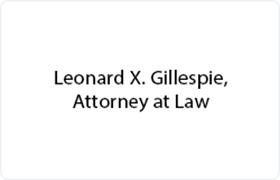New York Divorce & Family Law Lawyer, New York
Sponsored Law Firm
-
 x
x

Click For More Info:
-
Leonard X. Gillespie, Attorney at Law
16 Court Street Suite 2504 Brooklyn, NY 11241» view mapDivorce & Family Law We Care About Making A Difference
We are socially conscious, proud to be American and believe that race matters. We care. We want to make a difference.
800-769-4420
David Molot
✓ VERIFIED *Status is reviewed annually. For latest information visit hereThe Law Office of David Molot is a full service law firm that provides excellent representation throughout the state of New York and all throughout th... (more)
Pashan Movasseghi
✓ VERIFIED *Status is reviewed annually. For latest information visit hereWe are a full-service law firm that specializes in divorce and family law. Our principal attorney is a former prosecutor who regularly handles suprem... (more)
Andrew J. Spinnell
✓ VERIFIED *Status is reviewed annually. For latest information visit hereThe Law Offices of Andrew J. Spinnell is a general practice law firm concentrating in personal injury, landlord-tenant, matrimonial and commercial lit... (more)
Louis I. Newman
✓ VERIFIED *Status is reviewed annually. For latest information visit hereLouis I. Newman has been a member of the New York Bar since 1968 and has negotiated and tried hundreds of cases, including matrimonial cases which are... (more)
Courtney Davy
✓ VERIFIED *Status is reviewed annually. For latest information visit hereCourtney Davy proudly served his country as a member of the United States Marine Corps before receiving his Bachelor's and Juris Doctorate degrees. Co... (more)
David Blum
✓ VERIFIED *Status is reviewed annually. For latest information visit hereI graduated summa cum laude from the University of Miami where I clerked for the Hon. Edward Moore of the 11th Circuit Court and interned with the U... (more)
Jose A. Camacho
✓ VERIFIED *Status is reviewed annually. For latest information visit hereThe Law Firm of Camacho & Associates, P.C. is a General Law Practice with over 25 years concentrating on State and Federal Criminal Defense in the tre... (more)
Darryl Wynn
✓ VERIFIED *Status is reviewed annually. For latest information visit hereDarryl L. Wynn has been practicing law in New York State since 1988 and has worked in a number of settings, including private firms, government, publi... (more)
Leonard X. Gillespie
✓ VERIFIED *Status is reviewed annually. For latest information visit hereLeonard X. Gillespie is a practicing attorney serving Brooklyn, New York.
Asher Brian White
✓ VERIFIED *Status is reviewed annually. For latest information visit hereAsher White is a practicing lawyer in the state of New York.
 Leonard X. Gillespie Brooklyn, NY
Leonard X. Gillespie Brooklyn, NY Practice AreasExpertise
Practice AreasExpertise









